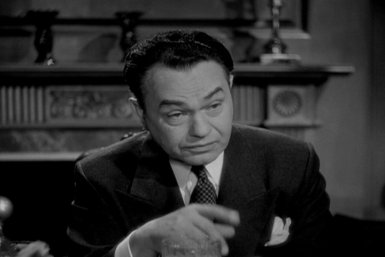Ill-Remembered History
Monday, 1 June 2009Recently, I began watching The Stranger (1946) for the first time in many years.
There are many things that one might say about this film, and in particular about the sociological aspects of this film. Here, I want to draw attention to one in particular.
Here's a clip:
On another page, I provide a fairly full transcription of the dialogue for the whole clip. Here, let me focus on a shorter excerpt from within this clip.
| Mr Wilson | (Edward G. Robinson) | … | undercover agent of the Allied War Crimes Commission |
| Franz Kindler aka Charles Rankin | (Orson Welles) | … | fugitive Nazi official, living under an assumed identity |
| Adam Longstreet | (Philip Merivale) | … | Justice of the SCotUS |
| Mary Rankin née Longstreet | (Loretta Young) | … | daughter of Judge Longstreet, newlywed bride of Charles Rankin |
| Noah Longstreet | (Richard Long) | … | son of Justice Longstreet |
| Jeffrey Lawrence | (Byron Keith) | … | town doctor |
| Red | (unknown) | … | Mary's dog |

Wilson: Do you know Germany, Mr. Rankin?
Charles: I'm sorry, I— I have a way of making enemies when I'm on that subject. I get pretty unpopular.
Wilson: Well, we shall consider it the objective opinion of an objective historian.
Charles: Historian? A psychiatrist could explain it better. The German sees himself as the innocent victim of world envy and hatred — conspired against, set upon by inferior peoples, inferior nations. He cannot admit to error, much less to wrongdoing, not the German. We chose to ignore Ethiopia and Spain, but we learned, from our casualty list, the price of looking the other way. Men of truth everywhere have come to know … for whom the bell tolled. But not the German. No, he still follows his warrior gods, marching to Wagnerian strains, his eyes still fixed upon the fiery sword of Siegfried. And [glances at Jeffrey] in those subterranean meeting places that you don't believe in, the German's dreamworld comes alive and he takes his place in shining armor, beneath the banners of the Teutonic Knights. Mankind is waiting for the Messiah; but, for the German, the Messiah is not the Prince of Peace. No, he's… 'sanother Barbarossa, another Hitler.
Wilson: Well, then, you, uh, you have no faith in the reforms that are being effected in Germany.
Charles: I don't know, Mr. Wilson. I can't believe that people can be reformed except from within. The basic principles of equality and freedom never have, never will take root in Germany. The will to freedom has been voiced in every other tongue [Wilson nods.] —All men are created equal,liberté, égalité, fraternité— but in German—
Noah: There's Marx:Proletarians, unite. You have nothing to lose but your chains.
Charles: But Marx wasn't a German; Marx was a Jew.
Justice Longstreet: But, my dear Charles, if we concede your argument, there is no solution.
Charles: Well, sir, once again, I differ.
Wilson: Well, what is it, then?Charles: Annihilation. Down to the last babe in arms.
Mary: Oh, Charles, I can't imagine you're advocating a … Carthaginian peace.
Charles: Well, as an historian, I must remind you that the world hasn't had much trouble From Carthage in the past … 2,OOO years.Justice Longstreet (chuckling): Well, there speaks our pedagogue.
Mary: Well, uh, speaking of teachers, Mr. Wilson, …
Wilson: Yes, huh?
Mary: The faculty is coming for tea next Tuesday. If you have nothing better to do, would you like to join us?
Wilson: Uh, I'd like to, but my work here is finished. [Charles smiles faintly.] I'm leaving Harper tomorrow.
(Later, Charles and Mary Rankin enter their home.)
Mary: Extraordinary, isn't it, clocks being Mr. Wilson's hobby, too?
Charles: Yes, isn't it?
Mary: Well, Red, how do ya like your new house?
Charles: He loves it. Come here, Red; I think I'll take you for a walk. Come here, boy.
Mary: Oh, darling, you don't have to take him out. Just let him out. He won't run off.
Charles: I need the walk; I'm restless. Come on, boy.
(At Wilson's room.)
Male voice from phone: That's good. How are you coming along?
Wilson: I'll be in Washington tomorrow afternoon. You were right about Rankin. He's above suspicion.
Notice that Professor Rankin has advocated genocide — wiping-out the Germans Down to the last babe in arms.
The only person at the table who raises the slightest objection is Mary, and even her response is mild. Wilson, the principal hero of the story, concludes from this advocacy that Professor Rankin is above suspicion
— the emphasis on above
is Wilson's — rather than, say, a pathological Germanophobe.
When Americans remember the war and its aftermath, we tend to forget that there was a time when preaching genocide, while a minority position, was socially acceptable. In fact, such sentiment reached up to the highest levels of government. Here are a couple of excerpts from The New Dealers' War by Thomas Fleming (which excerpts may be familiar to those who followed my LJ):
New Dealers and others around the president made no attempt to alter this dehumanizing war against the Japanese. In September 1942, Admiral William Leahy, Roosevelt's White House chief of staff, told Vice President Henry Wallace that Japan was
[…]our Carthageandwe should go ahead and destroy her utterly. Wallace noted this sentiment without objection in his diary. Elliot Roosevelt, the president's son, told Wallace some months later that he thought Americans should killabout half the Japanese civilian population. New Dealer Paul McNutt, chairman of the War Manpower Commission, went him one better, recommendingthe extermination of the Japanese in toto.At the White House on August 19, 1944, [Secretary of the Treasury] Henry Morgenthau told Roosevelt the British were much too benevolent in their postwar plans for Germany and so were the State Department and the European Advisory Commission. The Secretary was, incidentally,
shockedby FDR's appearance.He is a very sick man and seems to have wasted away,he told his diary. But that observation did not deter him from urging the president to stop this soft approach to Germany.Roosevelt's animus against the Germans erupted into fury.
Give me thirty minutes with Churchill and I can correct this,he told Morgenthau.We have got to be tough with Germany and I mean the German people, not just the Nazis. You either have to castrate [them] or you have got to treat them … so they can't just go on reproducing people who want to continue the way they have in the past.Morgenthau left the White House convinced that he had a mandate to create a better plan to deal with postwar Germany. He put Harry Dexter White in charge of a special committee
to draft the Treasury's analysis of the German problem. The result was the Morgenthau Report. It proposed to divide Germany into four parts. It also recommended destroying all the industry in the Ruhr and Saar basins and turning Central Europe and the German people into agriculturists. At one point Communist agent White, who was described by his Soviet handler asa very nervous cowardly person, feared they were going to extremes. He warned Morgenthau this ideal was politically risky; it would reduce perhaps 20 million people to starvation.I don't care what happens to the population,Morgenthau said.



